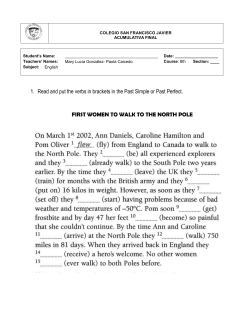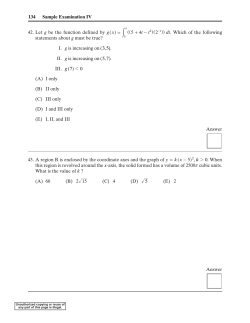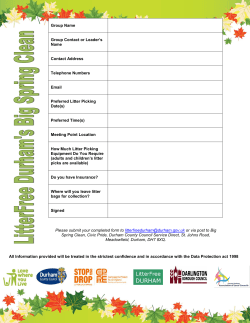
Caught in the Act - West Bradford Township
A QUARTERLY NEWSLETTER BROUGHT TO YOU BY YOUR TOWNSHIP Caught in the Act Protect Our Community by Reporting Illegal Dumping and Littering Make no mistake: Littering and illegal dumping are against the law. There are, however, subtle differences between the two. Litter is primarily small items that have been scattered, including paper, food and beverage containers, convenience products, newspapers, and cardboard. Littering can be intentional or accidental. For instance, some trash found along the road — items blown from yards and vehicles or debris left over from accidents — is the result of an unintentional act. Illegal dumping, on the other hand, is always intentional and done for many reasons: convenience, ignorance, habit, profit, or to hide other illegal activities. Illegal dumping often involves large items or large quantities of small items, such as appliances, tires, bags of household trash, furniture, and construction and demolition debris. Despite their differences, litter and illegally dumped items are costly and time-consuming to clean up. Both also pose significant threats to the environment and to the health and safety of humans, animals, and the communities they live in. Therefore, all of us play a role in curbing When someone litters or dumps trash illegally, it devalues our community and threatens the environment. You can help stop this costly problem by reporting such incidents to the township and other authorities. • Spring 2015 these problems. One way you can help: When you see someone littering or dumping items where they shouldn’t, report the incident to the proper authorities. Pay attention to the details Any improper disposal of trash — littering or illegal dumping — is against the law, and violators can be prosecuted. Many residents, though, are uncertain about what to do when they observe this illegal activity. Most important, if you observe someone littering or dumping, DO NOT APPROACH the suspect. Instead, get details and descriptions of the incident and turn them over to an enforcement agency as soon as possible. Helpful information includes: • The license plate number and description of the vehicle involved (make, model, year, and condition). • Number of people involved, along with descriptions. • Date and time of incident. • Direction of travel, if you witnessed a littering incident, and type of litter thrown from the vehicle. • Location and directions to the site of an illegal dump and the name of the property owner, if known. • Your name and telephone number. If a vehicle is involved, the owner is responsible for any trash that has been dropped, thrown, or deposited regardless of who committed the offense. The vehicle license number may be all that you need to report after witnessing a littering incident. However, the more information you provide, the stronger the case will be. Who to call When reporting littering or illegal dumping, always start at the local level. Your township officials, for example, are familiar with properties and residents and will be able to respond quickly or point you to the correct authority, which may include the following: • The Pennsylvania State Police, who have jurisdiction if the violation occurs on a state road or on public or private land that does not fall under the jurisdiction of local police. • The Pa. Department of Environmental Protection, which responds to complaints of illegal dumping on public or private property. The agency does not respond to litter complaints. 2015 Great American Cleanup Don’t miss this opportunity to improve your community Everyone wants to live, work, and play in a clean and green community. Therefore, it’s up to everyone to make it possible. Pennsylvanians across the state will be participating in the 2015 Great American Cleanup of PA, slated for March 1-May 31. During the event, groups will be cleaning up litter and trash along roadsides, streams, parks, forests and neighborhoods. Communities will also be holding recycling events for hard-to-dispose-of items, such as tires and appliances, creating or enhancing green areas by planting plants, bulbs, and trees, removing or painting over graffiti that devalues neighborhoods, and sponsoring other activities that help beautify hometowns. Registered events can get free cleanup supplies, such as bags, gloves and vests that are being donated by PennDOT and Keep America Beautiful. Community and civic associations, schools and youth groups, families and friends, business employees, hunting and fishing clubs, conservation organizations, sports teams, and others are encouraged to participate. For more information, visit gacofpa.org or call Keep Pennsylvania Beautiful’s tollfree hotline at (877) 772-3673, Ext. 113. • The Pa. Department of Conservation and Natural Resources, Bureau of Forestry, which responds to complaints of littering or dumping in state forests and parks. • The Pennsylvania Fish and Boat Commission, which oversees the commonwealth’s surface waters, particularly trout streams. • The Pennsylvania Game Commission, which should be contacted for littering or dumping incidents on state game lands or on private property that is open to hunting. Note: Information courtesy of Keep Pennsylvania Beautiful. The vehicle license number may be all that you need to report after witnessing a littering incident. However, the more information you provide, the stronger the case will be.
© Copyright 2025









